The keys to successful investing and money management are not financial, they're psychological.
{mp3remote}http://media.krcb.org/audio/nbr/4-2-09.mp3{/mp3remote}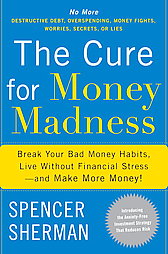
Spencer Sherman was motivated to write The Cure for Money Madness because he saw himself and others making financial mistakes, when they clearly knew better.
{mp3remote}http://media.krcb.org/audio/nbr/highlow.mp3{/mp3remote}s
Are you experiencing Monen Madness? Take Spencer's online quiz and find out.
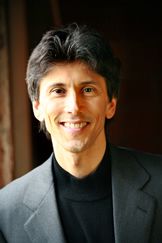
It's not just individual investors whose decision-making is compromised by their "money monsters." Sherman observes that even big financial companies exhibit some of the same flawed behaviors.
{mp3remote}http://media.krcb.org/audio/nbr/monsters.mp3{/mp3remote}
When adding up your personal net worth, Sherman recommends including a calculation of total career earnings up to retirement, to help add some long-term perspective.
{mp3remote}http://media.krcb.org/audio/nbr/earnings.mp3{/mp3remote}

Spencer Sherman talks about Money Madness at Copperfield's Books in Santa Rosa on April 2, and at Spirit Rock Meditation Center on April 19th.
He has also prepared this video preview to introduce some of the issues and ideas contained in The Cure for Money Madness.
[video:http://www.youtube.com/watch?v=lW5BnZcVDB8 400x400]
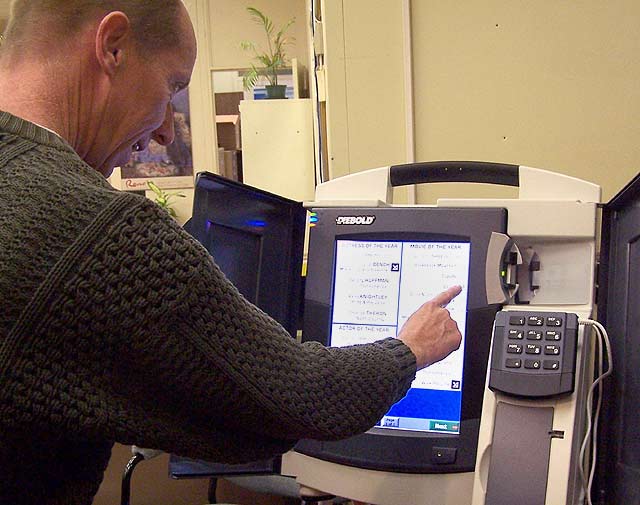 A widely used electronic voting machine has been decertified in California, after tests confirmed it sometimes deleted groups of ballots without counting them.
A widely used electronic voting machine has been decertified in California, after tests confirmed it sometimes deleted groups of ballots without counting them.

A co-founder and director of the Election Defense Alliance, Dan Ashby says this latest setback for electronic voting machines is further confirmation of their dubious reliability.
{mp3remote}http://media.krcb.org/audio/nbr/trend.mp3{/mp3remote}s
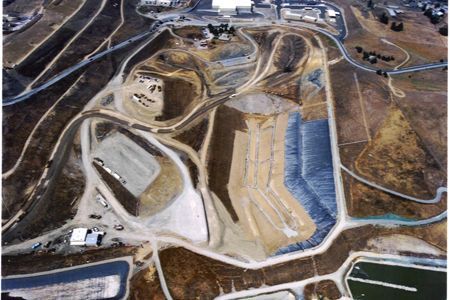 Sonoma County's main dump, seen from the air at left, has been closed since 2005, but its future continues to be hotly debated.
Sonoma County's main dump, seen from the air at left, has been closed since 2005, but its future continues to be hotly debated.
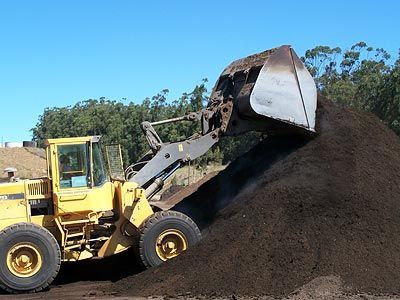
Operating a landfill anywhere in northern California is a difficult prospect in today's regulatory climate, observes Assemblyman Wes Chesbro, and even a well-funded private company must surmount those obstacles.
{mp3remote}http://media.krcb.org/audio/nbr/north.mp3{/mp3remote}A proposed Materials Recovery Facility (MRF) for Sonoma County could eventually be able to sort out and reuse as much as 90% of the region's waste stream. Alan Strachan, one of the backers of that project, suggests that through composting or other processes, even most of the remaining 10% could someday be reused.
{mp3remote}http://media.krcb.org/audio/nbr/10percent.mp3{/mp3remote}
Longtime recycling advocate Mike Anderson is one of many voices taking up the call for setting a goal of zero waste.
{mp3remote}http://media.krcb.org/audio/nbr/zero.mp3{/mp3remote}The March 30th forum on the future of the Sonoma County landfill was co-hosted by the Climate Protection Campaign and the Leadership Institute on Ecology nd the Economy.
The entire public forum was recorded and will be broadcast at the following times on Community Media Channel 26 in Santa Rosa:
| Monday, March 30 (LIVE) | 8am |
| Wednesday, April 1st | 5pm |
| Thursday, April 2nd | 12pm |
| Friday, April 3rd | 5pm |
| Saturday, April 4th | 6am |
| Sunday, April 5th | 5pm |
| Monday, April 6th | 8am |
| Wednesday, April 8th | 5pm |
| Thursday, April 9th | 12pm |
| Friday, April 10th | 5pm |
| Saturday, April 11th | 6am |
| Sunday, April 12th | 5pm |
More information and background about Ecoleader .
To learn more about the Landfill.
 The budget news from Sacramento remains grim, while the legislature awaits the decisions of the state's voters, in May's special election and beyond.
The budget news from Sacramento remains grim, while the legislature awaits the decisions of the state's voters, in May's special election and beyond.
{mp3remote}http://media.krcb.org/audio/nbr/3-30-09.mp3{/mp3remote}
The two pie charts below offer a snapshot of California's anticipated income and expenses for the current fiscal year.


For a summary and brief history of the measures on the California special election ballot on May 19, click the appropriate link below.
What must America do to effectively respond to the multiple crises that confront us as a nation today? Political writer William Greider's answer can be summed up in two words: Grow up! {mp3remote}http://media.krcb.org/audio/nbr/3-27-09.mp3{/mp3remote}

A staunch critic of the economic establishment, Greider has his own, contrarian ideas of how government should move to reestablish credit and restore order to the American banking system.
{mp3remote}http://media.krcb.org/audio/nbr/do.mp3{/mp3remote}
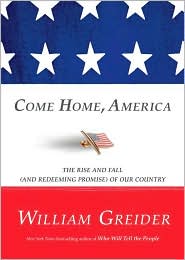
A former managing editor for the Washington Post, Greider has contributed to six "Frontline" documentaries on PBS, and is now the National Affairs correspondent for The Nation. This first-hand experience has made him keenly aware of the role that consolidation of media ownership in this country has played in fomenting our current crises. {mp3remote}http://media.krcb.org/audio/nbr/media.mp3{/mp3remote}
In his newest book, Come Home America, Greider offers both an analysis of the cultural and political missteps that have contributed to the current crises we face, as well as some no nonsense ideas for ways to recover and move forward. Here's an excerpt from the opening pages:
"I HAVE SOME HARD THINGS TO SAY about our country. Beyond recession and financial crisis, we are in much deeper trouble than many people suppose or the authorities want to acknowledge. Because I think Americans always deal better with adversity if they have a clear understanding of what they are confronting, this book will address the gloomy circumstances and rough passage I see ahead for the American people.
"Everything around us is changing, and Americans must change, too. First, we must be honest with ourselves, face the hard facts, and put aside some comforting myths. Then, we must find the nerve to take responsibility again for our country and democracy. Taking responsibility means having the courage to step up and reclaim our power as citizens. We have to relearn what many in earlier generations knew: how to assert our own ideas and values on what the future should look like, how to make ourselves heard amid the empty noise of politics, how to assert our convictions as aggressively as necessary to alter the course of history.
"Americans will get through this. Our country has been through far worse in the past. We can emerge from it in promising new ways, not necessarily richer, but wiser and joined more closely together as a people, more able to realize fulfilling lives. If we do the hard work. If we change.
"WE LIVE IN A COUNTRY where telling the hard truth with clarity has become taboo. Its implications are too alarming. Any politician who says aloud what some of them know or feel in their guts is vilified as defeatist or unpatriotic. Many are clueless, of course, and others are too scared to raise forbidden subjects. I understand their silence and I do not forgive them.
"This book is about hard truths that were mostly not addressed during the long and intensely reported campaign for the presidency. A few marginal candidates did challenge the orthodox version of American greatness, but their also-ran status ensured they would not be widely heard. Most politicians looked the other way and stuck to familiar themes of patriotic optimism. The news media did not help much, either, by generally adhering to conventional thinking and ignoring dissenting opinions. Under these circumstances, citizens are more or less on their own, and remarkably, they do often find their way to the truth about things. In these very difficult times, I hope this book will help them."
###
 William Greider's previous books include Who Will Tell the People: The Betrayal of American Democracy, and Secrets of the Temple, an inside look at the Federal Reserve Board.
William Greider's previous books include Who Will Tell the People: The Betrayal of American Democracy, and Secrets of the Temple, an inside look at the Federal Reserve Board.

 Live Radio
Live Radio